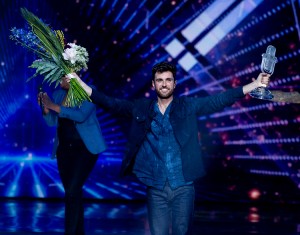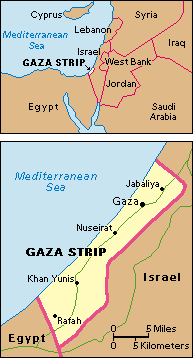Eurovision 2019
Wednesday, May 22nd, 2019May 22, 2019
On Saturday, May 18, at the Expo Tel Aviv in Israel, Duncan Laurence of the Netherlands won the Eurovision Song Contest with his song “Arcade.” The soaring ballad narrowly won over songs by Italian, Russian, and Swiss artists in the contest’s Grand Final. Held every year since 1956, Eurovision is the world’s largest and longest-running annual television song competition. Laurence was the first entrant from the Netherlands to win since 1975, when the group Teach-In won for its Dutch-language song “Ding-a-dong.”

Duncan Laurence of the Netherlands lifts a bouquet and the glass microphone trophy after winning the Eurovision Song Contest in Tel Aviv, Israel, on May 18, 2019. Credit: © EUPA-IMAGES/Shutterstock
This year’s Eurovision featured a performance by the United States megastar Madonna during the Grand Final “half-time,” but the five-day contest may be best remembered for a number of political protests. In 2018, Israeli singer Netti won for her song “Toy,” giving Israel hosting duties in 2019. The contest faced boycotts and protests because of the controversial policies of the government of Israeli Prime Minister Benjamin Netanyahu regarding the occupied Palestinian territories. The most startling moment came during the Eurovision semifinals, when the live broadcast was hacked with a fake alert of a missile attack and animated images of explosions in Tel Aviv, the host city. Throughout the contest, Palestinian banners and flags crept into the show.
In the end, however, music ruled the day at Eurovision. Laurence’s simple piano performance won out over a number of elaborately staged productions (including fog machines, rockets, and even gravity-defying dances on flexible poles). An impressive showing by Tamara Todevska (8th place for her song “Proud”) reminded the viewing audience that the Former Yugoslav Republic of Macedonia is at last—as of 2019—simply North Macedonia.
Long before “American Idol,” “The Voice,” “The X Factor,” or even “Star Search,” there was Eurovision. The show began as the “Eurovision Grand Prix” in 1956 and became the “Eurovision Song Contest” in 1968. Each year, primarily European countries submit one entry—one artist with one new and original song—to the Eurovision contest. Despite the great variety of nations participating, most songs are in English. The songs are each performed live—often with elaborate stage shows—and votes from the television audience are combined with those of a professional international jury to gradually narrow the competition to the Grand Final round. The final songs are then performed, and voting determines the overall winner, who performs again and receives the glass microphone trophy. This year’s competition began with 41 national entries; 26 took part in the Grand Final. Each year’s winning nation hosts the following year’s contest.
More than 50 nations have participated in Eurovision. All active members of the European Broadcasting Union (EBU) can take part in the contest. The EBU is a professional association of national broadcasters that negotiates and advocates on behalf of public broadcasters in Europe. The EBU also includes numerous non-European nations. It operates the Eurovision network, the world’s largest provider of international sports and news broadcasts.
The Swedish group ABBA’s superstardom began with the 1974 Eurovision contest, and the show kick-started the career of the French-Canadian star Céline Dion (singing for Switzerland) in 1988. Other Eurovision winners have included the French singer France Gall (1965) and the British group Katrina and the Waves (1987). In 1958, Italy’s Domenico Modugno placed third at Eurovision with his song “Nel Blu Di Pinto Di Blu,” better known as “Volare” (made famous by the American singer Dean Martin). In 1994, Eurovision first presented the Irish dance production Riverdance to international audiences. Ireland has won Eurovision seven times, more than any other country.



